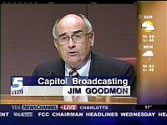Goodmon Calls For Standards at FCC Localism Hearing

CBC’s Jim Goodmon spoke about the need for measurable standards for broadcasters. |
FCC Chairman Michael Powell and Commissioners Michael Copps and Jonathan Adelstein traveled to Charlotte on Wednesday, October 22, 2003, to hold the first of six hearings for the Commission’s Localism Task Force. Capitol Broadcasting Company President & CEO Jim Goodmon spoke on one of two panels during the evening, addressing the issue of broadcasters’ responsibilities to their local communities.
Powell, one of three Republicans on the FCC who voted for loosened media ownership rules in June, said the hearing would be part of the record on whether to renew licenses of local TV stations, to address how broadcasters serve their local communities, not to deal with the issue of media ownership.
“To try to talk about localism without discussing media ownership is avoiding the issue,” said Raleigh singer-songwriter Tift Merritt, a panelist whose comment received the first spontaneous applause of the evening.
“All of us own the public airwaves,” said Copps. He & Adelstein both voted against the rules in June, losing 2-3. The two also sponsored a hearing at Duke University in Durham in July to address concerns of those such as Goodmon and Merritt, who say that bigger does not mean better.
Rep. David Price (D-NC) also attended the hearing and spoke about the deregulation that took place in the radio industry. “Many [radio] stations are now run by remote control,” he said. “Why would we want to send TV down the same path?”
During the open mike part of the proceeding, scores of attendees in the packed house lined up for a chance to speak. One speaker addressing the issue of recent incident where several DJs from a nationally owned corporation encouraged listeners to try to run bicyclists off the road said, “Deregulation of radio made this not possible, but inevitable.” Several audience members spoke about that particular radio stunt.
Goodmon called on the FCC to create standardized reporting and minimum standards so that stations’ commitment to the community can be measured. Quarterly report rule making would help broadcasters know how they are doing. “Every broadcaster I know, myself included, believes they are following the FCC rules and doing a good job of serving their local communities,” said Goodmon. But he said without standards of reporting that service, no one really knows how they measure up.
Goodmon also defended local in another way when he began his turn at the mike by chastising an open mike speaker for belligerently attacking Merritt. A radio DJ used his open mike time to accuse Merritt of self-promotion in attending the hearing.
“This is not about promoting my career,” Merritt responded. “It’s about giving North Carolina musicians and performers a voice – not just yours.” Earlier in her own presentation, Merritt had said, “I’m not here to complain that I’m not the Queen of the Radio. I’m a NC musician and NC businessman. You’re looking at local.”
Goodmon reprimanded the Charlotte DJ for being rude: “In the Freedom & Fairness Act, capitalism and money-making are not a goal.”